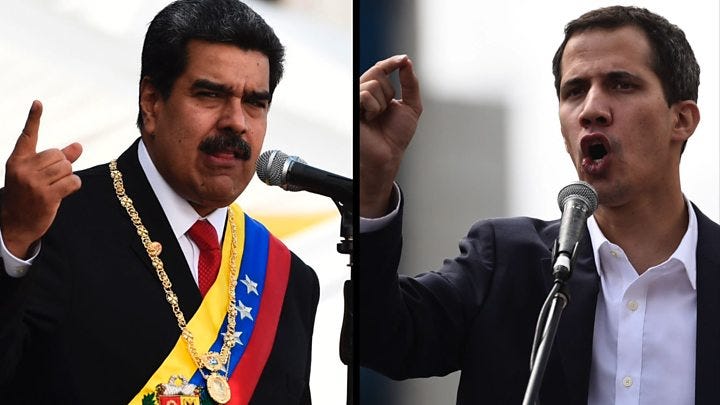🗺️ Picks of the Week — Dec. 18
Cocaine Ghost Boat Hits Marshall Islands, Iceberg Threatens 400k Penguins, Bolivia Finds New Snakes and Frogs, Liberia Constitution Change, Bhutan Decriminalizes Homosexuality, Venezuela Stalemate
Hello folks and welcome to the last Picks of the Week of 2020! It’s been a helluva year that’s seen us sail all the seas to dissect the most important and interesting news from around the world, and we hope to send you off into 2021 with another bumper issue. We’re going to rest our brains for two to three weeks over the holidays, but you might see the odd newsletter depending on how festive I feel. And rest assured those who need an updated job board will absolutely receive one.
Today we’ll visit Venezuela whose presidential political saga heats up after last week’s boycotted election; Bolivia where scientists have discovered a host of new frog and snake species; Liberia who approved a referendum to change the country’s constitution; Bhutan where homosexuality was decriminalized; the Antarctic where an iceberg larger than Luxembourg heads toward hundreds of thousands of penguins; and the Marshall Islands where an empty boat ran ashore with almost 1,500 lbs of cocaine.
Before we get to it, be sure to check out yesterday’s newsletter which marked the 10th anniversary since the beginning of the Arab Spring, and also the last Inside The Middle East of the year from Wednesday.
As this is potentially the last time I’ll speak to you amazing folks this year, I wanted to once again thank you for your backing and dedication. The success of this project has honestly been the highlight of my year, and I have lots of exciting new plans and features for 2021 (where the heck did 2020 go? 🤨). Anyway, thanks a billion and see you on the other side… ❤️🙏
Job Corner
Another 246 new positions added this week including at the likes of the BBC, CBC, the NBA and the Wall Street Journal. Subscribe and share below!
Preview of this week’s job board…👇
Data Corner
African Wealth: Poorest countries in Africa, from World Population Review
World Species: Data archive on the world’s species, from WWF
Icebergs: Global iceberg data, from the National Snow & Ice Data Center
Venezuela’s Political Stalemate
We start this week where we left off in last week’s dissection of Venezuela’s legislative election, boycotted by opposition leader and self-declared interim president Juan Guaidó. After elected President Nicolas Maduro claimed a landslide victory, Guaidó organized a “popular consultation” to ask whether Venezuelans accepted the election result, supported free presidential elections, and whether to grant the opposition a mandate to bring back democracy. Just less than 6.5 million people participated in the referendum, which the opposition said was its last constitutional resource after losing control of all Venezuelan political institutions.
However, the consultation didn’t attract crowds as big as last year’s opposition protests, which analysts claim was mostly symbolic with no real judicial weight. Despite his international support, Guaidó — who will lose his seat as leader of the opposition in January 2021 — hasn’t been as successful as first expected in his attempts to overthrow Maduro. Venezuela now finds itself in a political standoff, amid rapidly deteriorating economic and social conditions that have been compounded by the pandemic.
Bolivia Discovers New Snakes and Frogs
Staying in Latin America, we travel to Bolivia’s mountainous Zongo Valley in the Andes next, where scientists have discovered 20 new species in cloud forests around 3,000 meters (10,000 feet) above sea level. The discovery included venomous viper snakes, bright blue Morpho butterflies, and the lilliputian frog, one of the world’s smallest amphibians that is smaller than the size of a coin! Although their research has only just been published, ecological SWAT teams from Conservation International carried out the expedition in 2017.
Speaking to CNN, expedition co-leader Trond Larsen said the discovery surpassed his expectations and he was surprised to have re-discovered species, such as the devil-eyed frog that the team believed to be extinct. The re-discovered satyr butterfly, for example, was last seen 98 years ago. The conservation report calls for the urgent formal conservation of the ecosystem, which provides drinking water and hydroelectric energy for El Alto and La Paz.
(Daniel says even a picture of a snake on a screen scares the shit out of him, so sorry no picture of the new species…)
Previous Picks of the Week 👀
🔎 Picks of the Week — December 11
🔎 Picks of the Week — December 4
🔎 Picks of the Week — November 27
🔎 Picks of the Week — November 20
Giant Iceberg Threatens 400,000 Penguins
On a less positive environmental note, an iceberg around 4,000 square km known as A68a is drifting dangerously towards South Georgia island, a British overseas territory north of the Antarctic that happens to be one of the world’s most biodiverse places. The giant ice mass broke away from the Larsen C ice shelf in July 2017, and has since entered the Antarctic Circumpolar Current, which is propelling it north towards land. A team of British Antarctic Survey scientists is headed to the area to investigate.

Oceanographers are worried about the welfare of hundreds of thousands of penguins and countless other species, and a collision between the iceberg and island could happen within days. A collision, they warn, would destroy the wildlife’s habitat, and scientists are still debating whether the drifting iceberg is a result of climate change or simply part of the Antarctic Peninsula’s iceberg calving cycle. Melting ice caps, which are thawing six times faster than in the 90s.
Go Inside the home of 400,000 Penguins
Liberia Changes Constitution
Moving to Liberia next where the people have voted in favor of eight constitutional amendments proposed by President George Weah, the former professional football player. The changes include limiting presidential terms and lifting a 1973 ban on dual nationality. While the amendments appear progressive, opposition politicians fear Weah could use the change in constitution as a way to bypass the two-term limit, similar to how Guinea’s Alpha Conde did so in October.
Liberia is one of Africa’s poorest countries, in part due to back-to-back civil wars from 1989 to 2003 and then the Ebola crisis from 2014 to 2016. There’s hope the re-establishment of dual nationality will spark an economic boom for the nation of almost five million people. Last year, soaring inflation and cash shortages were among the grievances of thousands of protesters, who also accused Weah’s government of corruption. The referendum took place alongside midterm elections to decide on the country’s senators, and early results show opposition candidates winning.
George Weah 👇
Bhutan Lawmakers Remove Anti-Gay Legislation
Moving to the majority-Buddhist Bhutan next, where 63 out of 68 lawmakers voted to decriminalize homosexuality, which was previously described as “unnatural sex”. While the vote must still be approved by King Jigme Khesar Namgyel Wangchuck, activists are celebrating the historic feat.
Bhutan joins a list of Asian countries who have recently updated their legislation to increase the rights of LGBT+ communities. In 2018, India reversed a ban on gay sex, Taiwan became the continent’s first country to legalize same sex unions in 2019, and this year Thailand’s cabinet approved a bill affording same-sex unions many of same legal rights the country offers heterosexual marriages. In Bhutan, however, there is still discrimination against trans people, which activists attribute to a lack of education and understanding.

Cocaine Ghost Boat Hits Marshall Islands
Finishing off 2020, we travel to the Pacific Marshall Islands where a small, empty boat has ran ashore. Seems innocent right? Well that’s where the innocuousness ends. Police say that it wasn’t until a team attempted to move the 18-foot ‘ghost boat’ that they found an insane 1,420 pounds (649kg) of cocaine below deck. Police burned the majority of the stash, worth approximately $80 million/£61 million, in an incinerator and sent the rest to the U.S. Drug Enforcement Agency for testing.
Illegal drug seizures are far from uncommon in the Pacific archipelago, which is situated on a major international drug trafficking route. It’s thought that this particular shipwreck drifted from Central or South America over a period of years, and was the islands’ largest ever ‘interception’.


That’s all for this year. See you next in 2-3 weeks for more global fun! 👋







